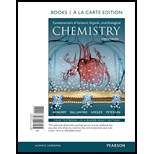
(a)
Interpretation:
The given precipitation reaction should be completed using balanced chemical equations.
Concept introduction:
In a balanced equation the number of atoms of each element as a reactant is equal to the number of atoms of that element as a product.
Coefficient is a number placed before a formula in a chemical equation.
A balanced equation should be obeying the law of conservation of mass. Law of conservation of mass states that, the number of atoms remains constant throughout the reaction, simply it can be stated as follows, “during a
A precipitation reaction takes place when two solutions of well soluble substances together form a poorly soluble salt.
(b)
Interpretation: The given precipitation reaction should be completed using balanced chemical equations.
Concept introduction:
In a balanced equation the number of atoms of each element as a reactant is equal to the number of atoms of that element as a product.
Coefficient is a number placed before a formula in a chemical equation.
A balanced equation should be obeying the law of conservation of mass. Law of conservation of mass states that, the number of atoms remains constant throughout the reaction, simply it can be stated as follows, “during a chemical reaction atoms are neither be created nor be destroyed”.
A precipitation reaction takes place when two solutions of well soluble substances together form a poorly soluble salt.
Want to see the full answer?
Check out a sample textbook solution
Chapter 5 Solutions
Fundamentals of General, Organic, and Biological Chemistry, Books a la Carte Edition (8th Edition)
- For each of the following reactions, give a balanced net-ionic equation. Sulfate Ion a) MgSO4 + H2SO4 b) MgSO4 + BaCl2 Sulfite Ion a) Na2SO3 + H2SO4 b) Na2SO3 + BaCl2 c) BaSO3 + HNO3 Iodide Ion a) NaI + NaOCl b) NaI + AgNO3 c) AgI + NH3 d) NaI + H2SO4arrow_forwardThe formation constants at 25°C for Fe(CN)4-6 and Fe(EDTA)2– are 1.00 x 1037 and 2.10 x 1014, respectively. Answer the questions below. 1) Calculate K under standard conditions for the reaction Fe(EDTA)2−(aq) + 6CN−(aq) ----> Fe(CN)4−6(aq) + EDTA4−(aq) 2) Calculate ΔG° for the reaction. (kJ/mol)arrow_forwardTwo solutions, 250.0 mL of 1.00 M CaCl2(aq) and 250.0 mL of 1.00 M K2SO4(aq), are combined, and the temperature decreased by 2.40 degrees C. Determine qrxn per mole of CaSO4(s) formed in the reaction. A) +12.0 kJ/mol B) -12.0 kJ/mol C) +6.00 kJ/mol D) -6.00 kJ/molarrow_forward
- Complete the following precipitation reactions using balanced chemical equations:arrow_forwardEthylene oxide is produced industrially from the reaction of ethylene with oxygen at atmospheric pressure and 277 oC, in the presence of silver catalyst.C2H4(g) + O2(g) → C2H4O(g) (unbalanced)Assuming 100 % yield, how many kg of ethylene oxide can be produced from 34600 L of a mixture containing ethylene and oxygen in 1:1 molar ratio?arrow_forwardArrange the following compounds in the increasing order of their boiling points :CH3CHO, CH3CH2OH, CH3OCH3, CH3COOH.arrow_forward
- Give a reaction equation for the qualitative and quantitative determination of I2.arrow_forwardConsider the intermolecular forces present in a pure sample of each of the following compounds: CH₃CH₂OH and CH₃COCH₃. Identify the intermolecular forces that these compounds have in common.arrow_forwardPropanamide and methyl acetate have about the same molar mass, both are quite soluble in water, and yet the boiling point of propanamide is 486 K, whereas that of methyl acetate is 330 K. Explain.arrow_forward
- For the following reactions, identify the atom(s) being oxidized and reduced:arrow_forwardA reaction at 23°C has ∆G = 1 kJ mol–¹. Why might this reaction become spontaneous at 37°C?arrow_forwardCalculate ΔG° (answer in kJ/mol) for each of the following reactions from the equilibrium constant at the temperature given. (d)CoO(s)+CO(g)⇌Co(s)+CO2(g) T=550°C Kp=4.90×102 (e)CH3NH2(aq)+H2O(l)⟶CH3NH3+(aq)+OH−(aq) T=25°C Kp=4.4×10−4 (f)PbI2(s)⟶Pb2+(aq)+2I−(aq) T=25°C Kp=8.7×10arrow_forward
